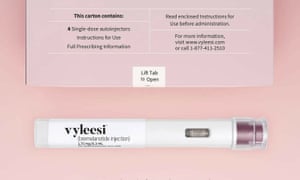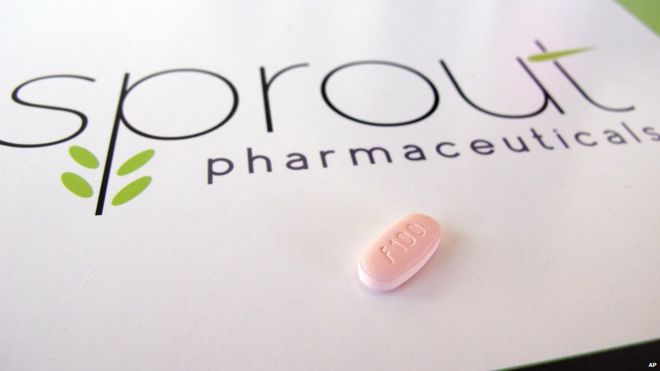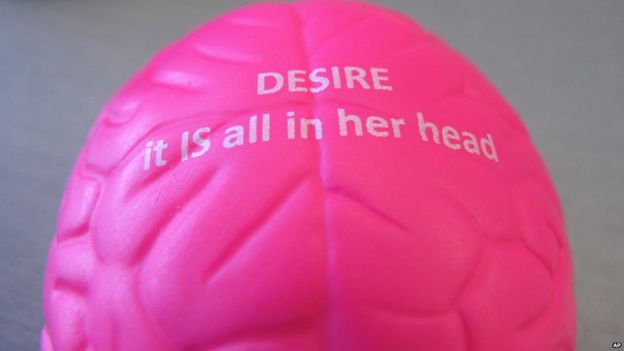Guardian Staff and agencies
An auto-injector for Vyleesi, chemically known as bremelanotide. Photograph: AP
Drug regulators in the United States have approved Vyleesi, the latest attempt to come up with a “female Viagra” for women with low sexual desire.
Vyleesi, chemically known as bremelanotide, is said to activate pathways in the brain involved in sexual desire, helping premenopausal women with hypoactive sexual desire disorder (HSDD). It has been developed by Palatin Technologies and licensed to Amag Pharmaceuticals, and is expected to be available from September through select pharmacies.
The drug will compete with Sprout Pharmaceuticals’ Addyi, a once-daily pill that was approved for HSDD in 2015 with a warning restricting alcohol use when on the medication. Addyi was approved under intense pressure from advocacy groups despite a review by scientists at the Food and Drug Administration (FDA) that deemed it minimally effective and possibly unsafe.
Vyleesi, which does not restrict alcohol use, is seen as having several advantages over Addyi including tolerable side effects, rapid-acting nature and not having to be taken every day, according to analysts.
The drug is administered as a shot into the abdomen or thigh using an auto-injector at least 45 minutes before anticipated sexual activity, with the FDA recommending patients not to take more than one dose within 24 hours or more than eight doses per month.
Side effects reported during clinical trials included mild to moderate nausea lasting no more than two hours and mostly occurred over the first three doses, Amag said. About 40% of patients in clinical trials experienced nausea.
The drug was developed by Palatin, and Amag holds exclusive North America sales rights. Palatin will get $60m from Amag for the approval plus additional payments for certain sales milestones and royalties.
Analysts have said that a drug that safely and effectively treats loss of sexual desire in women could eventually reach annual sales of about $1 billion.
Drug regulators in the United States have approved Vyleesi, the latest attempt to come up with a “female Viagra” for women with low sexual desire.
Vyleesi, chemically known as bremelanotide, is said to activate pathways in the brain involved in sexual desire, helping premenopausal women with hypoactive sexual desire disorder (HSDD). It has been developed by Palatin Technologies and licensed to Amag Pharmaceuticals, and is expected to be available from September through select pharmacies.
The drug will compete with Sprout Pharmaceuticals’ Addyi, a once-daily pill that was approved for HSDD in 2015 with a warning restricting alcohol use when on the medication. Addyi was approved under intense pressure from advocacy groups despite a review by scientists at the Food and Drug Administration (FDA) that deemed it minimally effective and possibly unsafe.
Vyleesi, which does not restrict alcohol use, is seen as having several advantages over Addyi including tolerable side effects, rapid-acting nature and not having to be taken every day, according to analysts.
The drug is administered as a shot into the abdomen or thigh using an auto-injector at least 45 minutes before anticipated sexual activity, with the FDA recommending patients not to take more than one dose within 24 hours or more than eight doses per month.
Side effects reported during clinical trials included mild to moderate nausea lasting no more than two hours and mostly occurred over the first three doses, Amag said. About 40% of patients in clinical trials experienced nausea.
The drug was developed by Palatin, and Amag holds exclusive North America sales rights. Palatin will get $60m from Amag for the approval plus additional payments for certain sales milestones and royalties.
Analysts have said that a drug that safely and effectively treats loss of sexual desire in women could eventually reach annual sales of about $1 billion.





